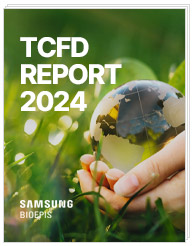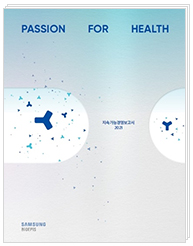ABOUT US
ESG
We are committed to being a socially responsible and sustainable company
by listening to our
stakeholders’ voices and understanding what their expectations are.
Samsung Bioepis is committed to pursuing sustainability management with a focus on ESG(Environment, Social, and Governance). We plan to share our yearly achievements and activities transparently through our annual report, and enhance the effectiveness of our sustainability management by gathering our various stakeholders' opinions and reflecting them.
-
Building a Sustainable Supply Chain
APPROACH
Samsung Bioepis selects suppliers according to strict criteria aimed at building and operating a responsible supply chain, and they are managed through a transparent registration system. For CMOs in particular, we carefully select companies that have obtained international standard (ISO) certification for their environmental management, energy management, and occupational health and safety management systems, verifying that they systematically practice environmental and safety management. Going a step further, we are reviewing the introduction of a policy for the preferential use of eco-friendly transportation as a way of governing the environmental impact of our supply chain. We are also discussing the use of additional ESG evaluation items in our processes for supplier selection, regular evaluations, and contract renewal.PERFORMANCE
- Distribution of 2016 Third-party Code of Conduct
- CMO ISO Certifications Oblation Rate
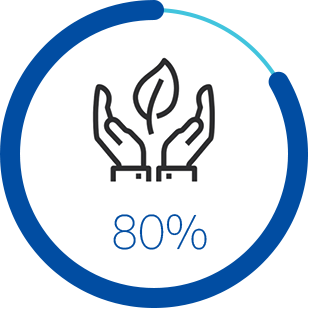
- ISO 14001
- Environmental Management System
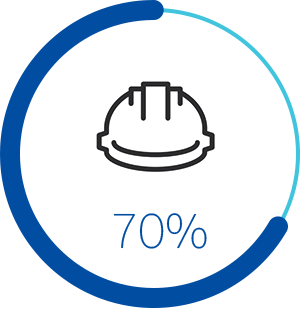
- ISO 45001
- Occupational Health and Management System
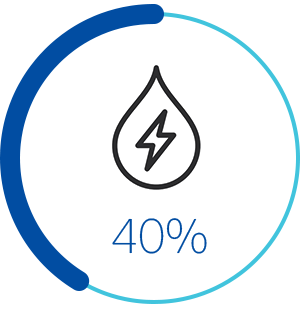
- ISO 50001
- Energy Management System
Supply Chain Assessment
Samsung Bioepis established supply chain assessment process for ESG risk management and conducted the pilot assessment of major suppliers in 2022. Going forward, we plan to manage supply chain risks that are related to ethics, human rights, labor, environment, safety and health, by gradually increasing the number of suppliers assessed for their risk management.
Based on the results of the supply chain assessment, Samsung Bioepis can recommend improvements for identified high risks to the extent not in violation of laws and regulations. In response, the suppliers shall develop a plan based on mutual consultation and take implementation actions.-
Supply Chain Assessment Process
-
Plan
Prepare Third-party
Code of Conduct and Checklist -
Do
Conduct risk
assessment -
Check
Analyze a result
Identify risks
-
Act
Improve action
itemsMonitor the
execution status
공급망 ESG 평가 프로세스 Classification New Supplier Assessment Regular Assessment Target New Supplier Existing Suppliers Period When registering a new supplier Annually Assessment
Criteria10 Compliance criteria that include ethics,
human rights, labor, environment,
and Health & Safety55 criteria of overall ESG management -
-
Supplier Tiering
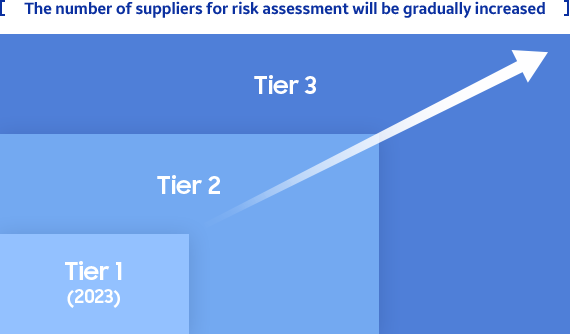
Supplier Tiering
Supplier Tiering Suppliers who have worked with less than
2 years or one-off business relationshipSuppliers who have worked with 2 years
or moreKey Service Providers such as CMO and CRO
Key Material Suppliers
- Strengthening Product Responsibility and Safety
APPROACH
By increasing market competition, biosimilars have become an important lever for the innovation of next generation biologics. While our focus remains on the development of high-quality biosimilars, we are now taking our first steps into novel biologic development. We are also looking to enhance the patient experience, including the development of ergonomic autoinjector devices and extended storage conditions for our products.PERFORMANCE
- Product development
 Biosimilars
Biosimilars
- 9/11
- Nine products approved
In eleven pipelines(As of July 2024)
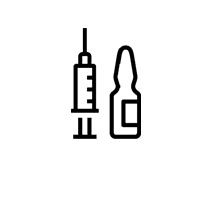 Novel biologics
Novel biologics
- 1
- One in development(As of July 2024)
- Strengthening Environmental Management
APPROACH
At Samsung Bioepis, we have established environmental management principles and systems adhered to the green management philosophy, which we are practicing across the company. As an R&D company with low energy consumption, we are not subject to targets for Greenhouse Gas (GHG) emissions and energy consumption. Nonetheless, we are continuing our proactive efforts to save energy and reduce emissions. Furthermore, we have put in place a management system for water resources, waste, air pollutants and hazardous chemicals, and we are introducing eco-friendly packaging materials as part of building a circular economy and enhancing resource efficiency.
We have established our systematic management processes by implementing ISO 14001 (Environmental Management System) and ISO 15001 (Energy Management System). With having those processes and systems in place, we are committed to making ongoing efforts to minimize environmental risks and impacts.
As the largest source of Samsung Bioepis’s greenhouse gas (GHG) emissions is from electricity consumption, increasing the use of renewable energy is crucial to reduce GHG emissions. In reflection of our commitment, we joined RE100, a global corporate initiative to run on Renewable Energy 100%, in November 2022. We will continue our efforts to cut GHG emissions.PERFORMANCE
- Reducing greenhouse gas emissions

- Using high-efficiency Equipment
- LED lighting
(90% of all lighting),
high-efficiency pumps,
high-efficiency
heat pumps

- Reducing energy consumption
- Lights/HVAC turned off,
Outside of work hours, cooling control system with inverters

- Installing solar panels
in 2022 - Generator power
200kW
- Enhancing resource efficiency

- Developing eco-friendly packaging
- Package size reduction,
use of paper trays,
no plastic coating

- Promoting eco-friendly shipping
- No PVC wrapping,
shipper boxes made of
recycled paper
-
Human Rights Charter
As a global biopharmaceutical company, Samsung Bioepis respects the human rights of all stakeholders involved in our business activities. We respect international human rights principles outlined in the Universal Declaration of Human Rights (UDHR), the UN Guiding Principles on Business and Human Rights (UNGPs), the OECD multinational business guidelines, the UN Convention on the Rights of the Child, the Core Conventions of the International Labor Organization (ILO), and Corporate Human Rights Benchmark (CHRB), as well as the local and national labor and human rights laws governing the locations in which we conduct business.
-
ESH (Environmental, Safety and Health) Policy
Samsung Bioepis prioritizes securing the safety and health of customers, employees, and community while we comply with rule & process to prevent accidents and to protect environment, and practice compliance management.
Recognizing that safety, health and environmental protection are of the utmost value and should not be compromised in any circumstances for corporate sustainability management, Samsung Bioepis will :
-
Pharmaceutical in the Environment
As a biopharmaceutical company, all of our products are biologic medicines which are similar to proteins in nature. The active pharmaceutical ingredients of our products are non-hazardous, biodegradable, mainly consisting of amino acids / proteins / carbohydrates. Based on these characteristics, our products will go through rapid and extensive degradation, that will minimally result in a significant environmental risk.
-
Sustainable Supply Chain Management
As a global biopharmaceutical company, Samsung Bioepis pursues its business strategy that incorporates both economic and wider social values across its business activities.
In addition, securing a sustainable supply chain will enable us to strengthen our purchasing competitiveness and risk management capabilities while helping us to establish appropriate monitoring system. We have established the Purchasing Code of Ethics, Purchasing Management Regulations, and Supply Chain Assessment Regulations to create a transparent and fair trade environment, and also to better manage the potential risk in our supply chain.


